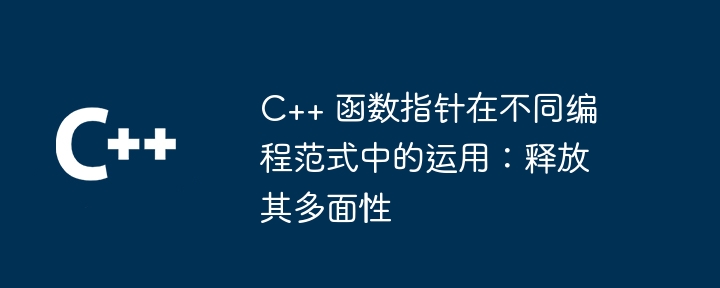
Function pointers are versatile tools in C and play a key role in different programming paradigms: Object-oriented programming (OOP): used as callbacks, functions that are called from the outside and passed in additional data. Functional programming (FP): Used as parameters or return values of higher-order functions, applied to data structures such as arrays. Metaprogramming (MP): Manipulating programs at compile time to create code with dynamic properties.

The use of C function pointers in different programming paradigms: unleashing their versatility
Function pointers play a key role in C Roles allow programmers to treat functions as first-class citizens. This flexibility opens the door to a variety of programming paradigms, making C a versatile and powerful programming language.
Object-oriented programming (OOP)
Function pointers in OOP are mainly used to implement callback methods. A callback is a function that is called from the outside and passed in additional data. For example, in event-driven programming, you can register a callback function to be called when an event occurs.
class Button {
public:
using Callback = void(*)(); // 定义回调函数类型
void RegisterCallback(Callback callback) {
_callback = callback;
}
void OnClick() {
if (_callback) { // 回调函数非空时调用
_callback();
}
}
private:
Callback _callback;
};
int main() {
Button button;
button.RegisterCallback([]() { std::cout << "Button clicked!" << std::endl; });
button.OnClick(); // 模拟用户点击按钮
}Functional Programming (FP)
Functional programming emphasizes immutability, the use of pure functions and higher-order functions. In FP, function pointers are used to pass functions as arguments or to return from functions.
auto Increment = [](int x) { return x + 1; };
int Map(int* array, int size, decltype(Increment) f) {
// 将 f 函数应用于数组中的每个元素
for (int i = 0; i < size; ++i) {
array[i] = f(array[i]);
}
}
int main() {
int array[] = {1, 2, 3, 4, 5};
Map(array, 5, Increment); // 将 Increment 函数应用于数组
}Metaprogramming (MP)
Metaprogramming involves manipulating a program at compile time, rather than at runtime. Function pointers are used in MP to create code with dynamic characteristics.
#include <type_traits>
#include <iostream>
template <typename T>
struct IsInteger : std::is_same<T, int> {};
int main() {
std::cout << IsInteger<int>::value << std::endl; // 输出:1
std::cout << IsInteger<float>::value << std::endl; // 输出:0
}Function pointers are a powerful tool in C that enable programmers to customize and extend their code to fit various programming paradigms. By mastering function pointers, C developers can create flexible, maintainable, and efficient applications.
The above is the detailed content of C++ function pointers in different programming paradigms: unleashing their versatility. For more information, please follow other related articles on the PHP Chinese website!
 What are the differences between c++ and c language
What are the differences between c++ and c language
 Recommended learning order for c++ and python
Recommended learning order for c++ and python
 Cost-effectiveness analysis of learning python and c++
Cost-effectiveness analysis of learning python and c++
 Is c language the same as c++?
Is c language the same as c++?
 Which is better to learn first, c language or c++?
Which is better to learn first, c language or c++?
 The difference and connection between c language and c++
The difference and connection between c language and c++
 C++ software Chinese change tutorial
C++ software Chinese change tutorial
 Cost-effectiveness analysis of learning python, java and c++
Cost-effectiveness analysis of learning python, java and c++




